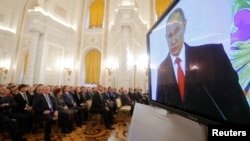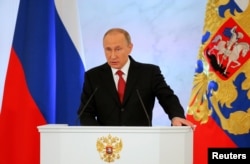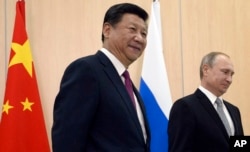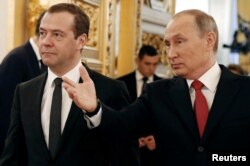President Vladimir Putin said Thursday that Russia is "ready to cooperate" with the administration of U.S. President-elect Donald Trump, adding that it is "important to normalize and develop bilateral relations on an equal and mutually beneficial basis."
Speaking during his annual "state of the nation" address to the Russian parliament and the Federal Council, Putin said cooperation between Russia and the United States "in addressing global and regional issues" is "in the interest of the whole world."
The two countries "share responsibility for ensuring international security and stability, strengthening non-proliferation regimes," he said, adding that any attempt to break "strategic parity" would be "extremely dangerous" and could lead to "a global catastrophe."
Putin said he is counting on "an alliance with the United States in the struggle against a real, not an imaginary threat — international terrorism." The Russian military, he said, is accomplishing that task in Syria, where it has inflicted "significant damage" on "terrorists."
Donald Trump
During the U.S. presidential campaign, Republican candidate Trump praised Putin's leadership and criticized Democratic Party candidate Hillary Clinton for speaking "very badly" of Putin. Several days after Trump's election victory, the Kremlin said he and Putin had agreed in a telephone call that U.S.-Russian relations were “unsatisfactory” and that they should work together to improve them.
In his speech Thursday, the Russian president also emphasized his country's relationship with China, stating that "the Russian-Chinese comprehensive partnership and strategic cooperation" is a key factor "for ensuring global and regional stability."
Domestic issues
The bulk of Putin's speech focused on domestic issues.
He noted that 2017 will mark the 100th anniversary of the 1917 revolutions that overthrew the tsar and ushered in Communist rule. While he said that this historical legacy must be treated with "respect," he also called it "unacceptable" to "drag the splits, anger, resentment and bitterness of the past into our present life."
Putin also discussed health care and education. Acknowledging that disregard for patients is widespread among Russian doctors, he called for developing high-tech patient-centered care. He also said Russian education must be revitalized to teach children “independent thinking” and develop their creativity.
Putin delivered his first annual address to Russia's parliament in 2000 and six more between 2001 and 2007. The Russian constitution bars a president from serving more than two consecutive terms, and in 2008, Putin assumed the post of prime minister. In December 2008, a new constitutional amendment extended the president's term from four to six years.
He was re-elected president in 2012.
Quoting philosophers
In his previous annual "state of the nation" speeches, Putin has quoted Russian philosophers. In 2013, he cited Nikolai Berdyaev, the Russian Christian existentialist philosopher. In 2014, it was the Russian émigré political and religious philosopher Ivan Ilyin. Last year, Putin chose Dmitri Mendeleyev, the founder of Moscow State University.
This time, Putin turned to 20th century thinker Alexei Losev, referring to him as an "outstanding Russian and Soviet philosopher." The president chose a quote from Losev on sacrifice and suffering as a part of Russian national character.







